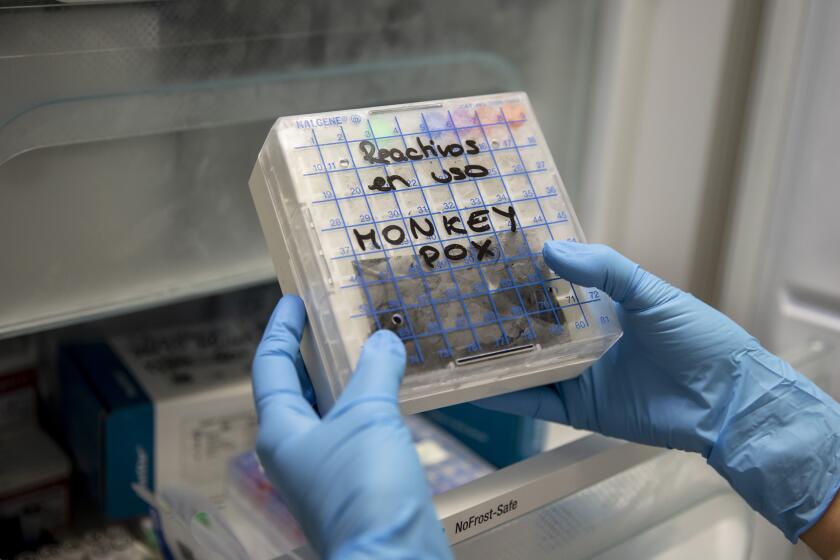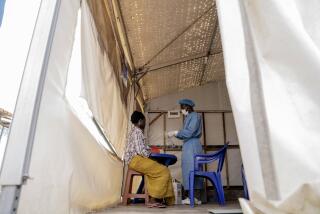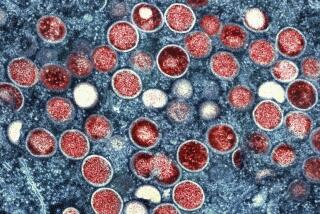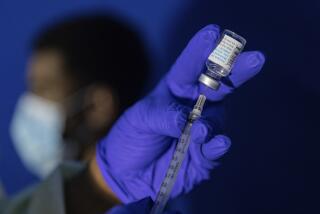Column: Why are we botching the monkeypox response? Blame homophobia
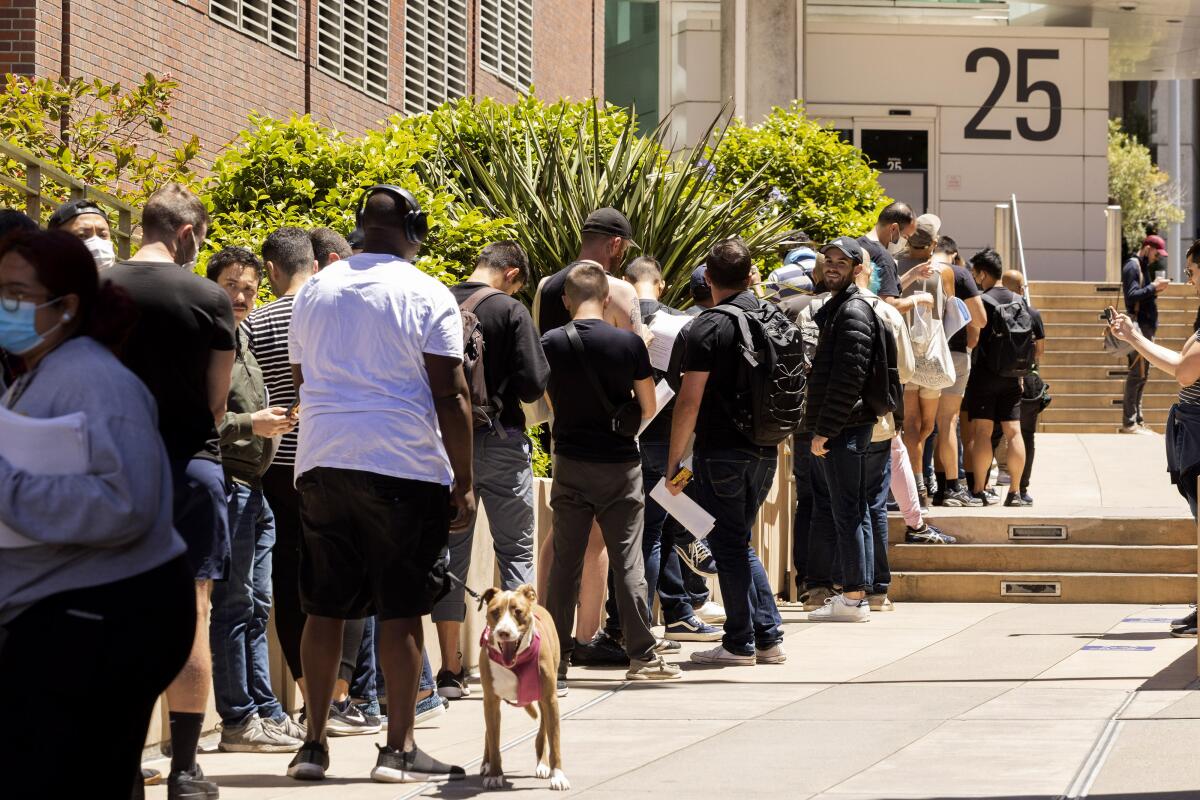
- Share via
State Sen. Scott Wiener, who represents San Francisco, was at a birthday gathering of mostly gay men recently when the conversation turned to monkeypox.
“We are on our own as always,” Weiner recalls someone saying. “We can’t count on anyone else.”
Sadly, such feelings of isolation and frustration are being borne out by a so-far sluggish and botched response to monkeypox, mostly at the federal level, as the disease spreads among bisexual, transgender and communities of men who have sex with men.
The virus leads to a painful and seriously gross infection that few of us want to think about — pus-filled sores similar to chicken pox — especially during the ongoing exhaustion of the COVID-19 crisis. But in the midst of a pandemic during which we supposedly learned the value of quick action to educate and vaccinate, the response to monkeypox is appalling and suggests a collective indifference that stems from the disease largely hitting LGBTQ communities.
Wiener and others compare it to the AIDS epidemic, which first popped onto the scientific radar with a paper in June 1981 that detailed a rare lung infection in five gay men in Los Angeles. For decades, those hit hardest by the then-deadly virus fought not just for care, but for society at large to notice and help. Although monkeypox isn’t fatal, usually clearing up without serious side effects in a few weeks, Wiener says he sees similarities between that era and now.
“Once again we have a public health failure for a disease affecting my community,” he told me. “As a gay man, it is really terrifying.”
And wrong — ethically, morally and medically.
As of Tuesday, the Centers for Disease Control and Prevention reported 267 cases of the virus in California, the second-highest number after New York, where 581 people have tested positive. Los Angeles reported 132 cases as of Wednesday, a number that is steadily climbing — it was 120 on Tuesday.
But these aren’t isolated outbreaks in cities with diverse populations. Georgia has 132 cases. Illinois has 200. Texas has 81.
Monkeypox is nearly everywhere, in at least 45 states, with more than 2,100 cases across the U.S. so far.
For years, infectious-disease experts have warned this could happen. Unlike COVID-19, this isn’t an unknown virus that dropped like a bomb from nowhere, though a recent study alarmingly found that the strain of the virus currently circulating is mutating far faster than expected. We’ve known about monkeypox since the 1950s and have vaccines and tests — just not enough of them. We also lack a clear plan for getting the available ones to the people who need them most.
Some in the LGBTQ community are worried that the vaccine shortage will allow for spread of monkeypox.
California is expecting thousands more doses of the leading vaccine from the federal government in coming days, but it still won’t be enough to protect everyone who wants and needs protection. At a press conference in Los Angeles on Wednesday, Anthony Rendon, the leader of the state Assembly, called on U.S. Health and Human Services Secretary Xavier Becerra to declare a public emergency to mobilize resources, and others called for sufficient supplies of vaccines to cover healthcare workers and everyone in affected communities.
That is common sense, but already the holes in the safety net are growing wider.
In San Francisco, hundreds are waiting in hours-long lines for a chance at the vaccine — only to be turned away when doses run out. In L.A., vaccine recipients are being prioritized by strict criteria until more doses arrive — though those guidelines were widened this week. Some places don’t have enough of the vaccine to even count as a public health response. Fresno announced its first confirmed case this week, and a spokesman for its health department told me the county has 20 doses of the vaccine, and 20 more on order. That supply will run out quickly.
Rendon pointed out that monkeypox testing isn’t covered by Medi-Cal, the state insurance plan for low-income people — creating a huge barrier for the most vulnerable. And those with confirmed cases are being required to isolate for weeks. In Los Angeles, the health orders come with the threat of a misdemeanor charge for disobeying, according to one person who received the notice from authorities (the Department of Public Health said similar orders were issued for COVID-19). But so far, there is no financial aid for those forced to isolate, a problem both Wiener and Rendon said they hope to fix when the Legislature reconvenes next month.
All of that chaos is playing out against a backdrop of attacks by the far right on LGBTQ communities across the country. The MAGA types, too many of whom are white supremacists and Christian nationalists, are on the offensive against LGBTQ communities as the next target in their effort to dismantle human and civil rights.
The right to same-sex marriage is in jeopardy. Far-right media including Fox News regularly make false claims that anyone who is not heterosexual is somehow “grooming” children, thinly veiled accusations of pedophilia based on sexual orientation. Here in California, Proud Boys have twice in recent months disrupted LGBTQ events with hate-filled rhetoric, including barging into a drag queen story time at a Northern California library.
It doesn’t take much imagination to figure out how the far right is framing monkeypox. I won’t give that ugliness any more air, but the disease and our hesitancy around it “plays into the hands of the far right, which is always seeking to manipulate any crisis,” Rendon said when I spoke with him prior to the press conference.
That reality is already affecting the public health response. Behind the scenes, there is debate and division on what the messaging should be. Some want to focus on the fact that monkeypox can affect anyone and can be transmitted without sexual contact — making it a risk to us all.
Close skin-to-skin contact with someone with sores can spread it, as can contact with items like infected bedding. It can also be spread by respiratory droplets, though it requires much more exposure than the coronavirus — more along the lines of kissing or caring for an ill person in close quarters. And the CDC is warning it can be transmitted through animals, such as pets living with an infected person. With fall coming, it’s not hard to foresee a school outbreak at some point, or a superspreader event at a concert or festival.
Others want to focus on its spread through communities of transgender people and men having sex with men. Since those are currently people at the highest risk, it makes sense to target education and vaccinations to these groups. Pride Month, with its many celebrations, just ended — likely portending more cases in coming weeks. Other celebrations, such as San Francisco’s Folsom Street Fair, are coming up — providing a great way to reach vulnerable communities with on-the-spot vaccinations.
But some fear messaging focusing only on LGBTQ communities will lead to further stigma and attacks, feeding into that far-right fear mongering and fueling prejudice. That could have the effect of dissuading some from seeking care if they do contract monkeypox, and give the general public the false sense that this virus isn’t a problem for us all.
Thankfully, this isn’t the 1980s, Kate Bush’s resurgence aside. Those most affected by monkeypox aren’t afraid to speak out, and to demand better.
Matt Ford, an actor, writer and producer who splits his time between West Hollywood and New York City, made a TikTok about his bout of the pox that went viral and started some important conversations.
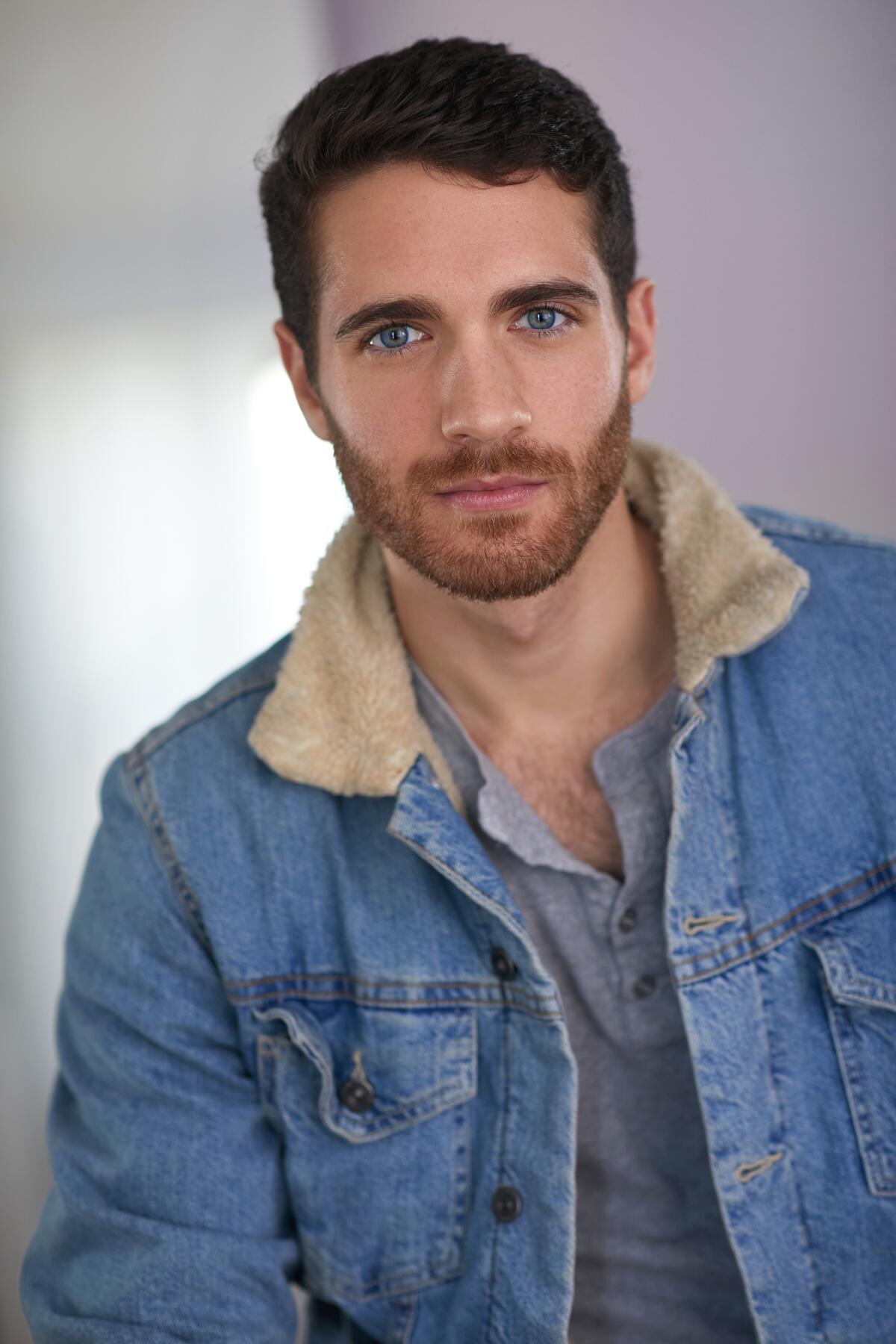
On June 17, Ford, who had not thought much about monkeypox until then, received a call from a friend whom he’d spent time with the week before — and who now had monkeypox. Within minutes, Ford realized he had sores too. By the time he was able to secure a test result a week later, the lesions, about 25 total, had spread to his face and lots of other places, putting him in so much distress he couldn’t sleep without painkillers.
Ford had the good sense to isolate himself as soon as he saw the spots, but after the confirmed diagnosis, he received a health order requiring him to stay in his home — which he did for three weeks and three days, until cleared by a medical visit.
When I spoke with him this week, he was back in New York and happy to be free. And despite the trolls, happy he spoke out.
“I think a lot of people weren’t taking it seriously before, myself included,” he said. He hopes “being candid about it and reiterating there is no reason for shame and stigma” helps change the conversation.
It’s an alarming time, he said of all that far-right furor, and he hopes “people show up for us in this moment,” for the health of a vulnerable community and the health of a democracy that is being purposefully divided by hate.
I do too, because indifference is its own virus — one we should be ashamed to spread.
More to Read
Sign up for Essential California
The most important California stories and recommendations in your inbox every morning.
You may occasionally receive promotional content from the Los Angeles Times.
